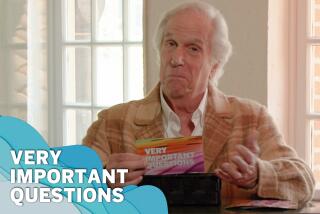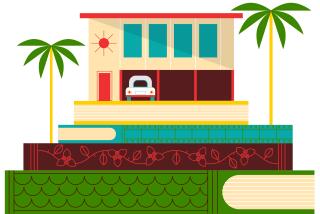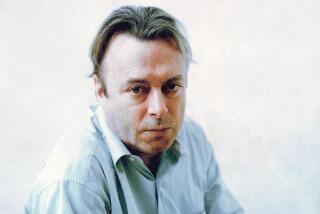A Courageous Journey Along the Road to Closure--and Success : Books: Columnist DeWayne Wickham writes of his troubled life--his parents’ murder-suicide, the pain of poverty and his brother’s homosexuality.
It takes an entire village to raise a child .
--African proverb
*
In 1954, when DeWayne Wickham was 8 years old, his father shot and killed DeWayne’s mother and then committed suicide.
Left to be raised by an aunt already struggling to provide for her own kids, the little black boy found an unlikely refuge--a Jewish country club called Woodholme.
There, his fellow caddies and even some of the wealthy members provided the advice and direction his own life had been missing.
“There are people who really tried to help me. And even though they don’t realize it, it did work.”
Now a 48-year-old syndicated columnist for USA Today and the Gannett News Service, Wickham has written a book, “Woodholme: A Black Man’s Story of Growing Up Alone” (Farrar, Straus & Giroux), about his childhood in Baltimore during the 1950s and ‘60s.
“Woodholme became for me the bridge over troubled waters,” Wickham said in a recent interview. “It was a place I could go and no questions would be asked about my parents.”
The country club opened in 1927 as a retreat for wealthy Eastern European Jews. In Wickham’s book, it also serves as a microcosm of race relations in the ‘60s.
“A lot of club members treated caddies, regardless of their age, like children,” Wickham writes. One who reached out to him was 16-year-old Richard Kress, a descendant of one of the founders.
The African American youth from the projects and the wealthy Jewish boy developed a mutual admiration based on their love of golf. As Kress’ caddy, Wickham shared in the glory when Kress’ team won the club’s prestigious Calcutta Tournament. After that victory, Wickham was treated “like a returning hero. After all, it was my guy who had rallied his team to win the Calcutta with the [crucial] putt.”
Kress was one of the first to take an interest in Wickham’s education when the youth began flunking out of high school.
One of the caddies, an older black man named Pop Henry, also kept a close eye on young Wickham. In one scene, Henry berates him for not taking his education seriously and advises him to strive for more from life than caddying.
“I come out here because I don’t have no choice,” Henry tells Wickham. “But you a young boy with mo’ life in front of you than behind you.”
Writing the book helped him to exorcise the demons of his childhood while learning about the parents he lost so early.
“My life is no longer a big secret,” he said. “I found out things I never knew about my parents.”
Wickham deals openly with the trauma of the murder-suicide, the pain of poverty and his struggle with his older brother’s homosexuality--topics many of his family members have still not dealt with.
“My sister has read the book and said she and her husband sat in bed one night laughing about some of the things that happened when we were young,” Wickham said. “She didn’t talk about what happened with my parents, though.”
The columnist said he needed a sense of closure.
“I always had that book in me,” Wickham said. “I needed to get beyond my parents’ death.”
According to Wickham, the memoir was sparked by a meeting he had several years ago with an agent about a book he was thinking of writing on black politics. As they talked over lunch, Wickham talked about his childhood as a black caddie.
“He very dramatically yelled, ‘That’s the book. That’s the book,’ ” Wickham said laughing.
But talking about his golf course memories and peeling away the layers of pain over his parents’ death took effort. Once he sat down to write, though, the memories came flooding back.
“I also had some help,” he said. “A lot of the people in my book are still around.”
Those people help to refine Wickham’s memories of life at Woodholme. Like many young black men from his impoverished neighborhood, Wickham journeyed to the club to make money toting the golf bags of well-to-do members. What he found among the caddies was an extended family.
Despite the title, he acknowledges that several people contributed to shaping his life. From caddies to teachers, they practiced community parenting to reach out to a child who showed great promise but hid it under a veneer of toughness.
The word “alone” in the title refers to the wall Wickham built around himself.
“I was always the strong one when tragedy struck others,” he said. “I realize now that it was a weakness.
“If there’s a tragedy, there has to be grief.
“For so many of these people I was never in the position to say ‘thank you,’ ” said the author, who now lives in an upper-middle-class Baltimore suburb and runs into some of his childhood cronies from time to time.
He is very aware that he is lucky to have made it out of the ‘hood. The book ends with Wickham at 18--a new, unmarried father--leaving the caddy shack for military service.
Since then, Wickham has become one of the most widely read African American columnists in the country and a regular on “Lead Story,” a news debate show on Black Entertainment Television. He counts among his friends such influential African Americans as lawyer Johnnie L. Cochran, who co-hosted a recent book signing for the author at the Los Angeles African American Museum of Art. Cochran said Wickham’s book is “the kind of reading we need in the African American community.
“Here’s a man who represents the absolute best and he would not be stopped despite the incredible odds he faced,” Cochran said. “He’s a role model.”
Now married and the father of three daughters, Wickham says his tough childhood has caused him to dote on his children and fully appreciate the life he has now. And he has no regrets about telling the world his story.
“People said to me, ‘Why are you going to write this book? Why don’t you let them rest in peace?’
“I said, ‘They have their peace, let me get my peace.’ ”
More to Read
Sign up for our Book Club newsletter
Get the latest news, events and more from the Los Angeles Times Book Club, and help us get L.A. reading and talking.
You may occasionally receive promotional content from the Los Angeles Times.






